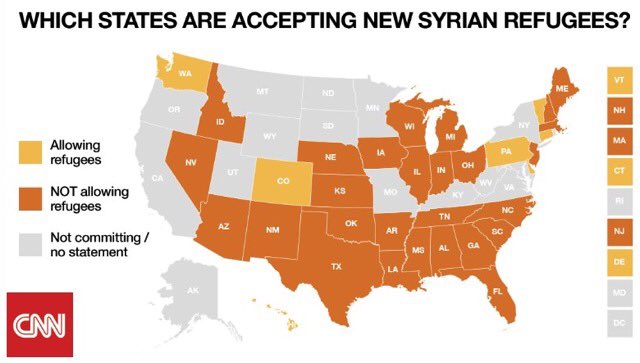Sure, not all immigrants or refugees are terrorists or connected to terrorism, but due to the fact there is no way to check and verify backgrounds from people out of the Middle East, especially Syria, it is irresponsible to even suggest all can be checked.
If one questions the pushback, then one must remember the Tsarnaev family and the Boston bombing or take a long look at Minneapolis and how that city has a history of Somalis that have left America to fight jihad.
Zacharia Yusuf Abdurahman, 19, Adnan Farah, 19, Hanad Mustafe Musse, 19, and Guled Ali Omar, 20, were arrested in Minneapolis. Abdirahman Yasin Daud, 21, and Mohamed Abdihamid Farah, 21, were arrested in San Diego after driving there in hopes of crossing into Mexico.
Barack Obama’s National Security Advisor, Ben Rhodes stated that the Federal government has robust methods to verify backgrounds. That is indeed in dispute. Per Ben Rhodes, he mentioned using the National Counterterrorism Center was one of the resources, yet upon a in depth review of the website, they don’t do background checks at all.
If there is any truth at all to be told, the United Nations controls the flow and background checks of the refugees. No one wants to admit that due to the fact, an outside bureaucratic organization has control over the flow on people into countries, including the United States. The United Nations coordinates with other organizations as well including the International Rescue Committee. The UN has a wing called the Human Rights that manages who is called a refugee or those called ‘stateless’ people. In turn, the U.S. State Department has its own bureau that has charitable organizations, paid by government to place refugees in locations across the Unite States, without notice or approval of governors or mayors.
For some testimony by the State Department on the Refugee Admission Program, click here.
There is not a single person within the Obama administration that can make guarantees with full confidence that all people admitted are without any questionable background, there in lies the issue.
The White House is so panicked about so many bi-partisan governors pushing back to stop the program into their states, there is a conference call with those governors and the White House on November 17. Perhaps some will ask why no Christians but further why in America when there are other locations across the globe more conducive the migrant needs.

U.S. ‘discriminates’ against Christian refugees, accepts 96% Muslims, 3% Christians
Less than 3 percent of the Syrian refugees admitted to the United States so far are Christian and 96 percent are Muslim, the result of a referral system that Republican Sen. Tom Cotton says “unintentionally discriminates” against Christians.State Department figures released Monday showed that the current system overwhelmingly favors Muslim refugees. Of the 2,184 Syrian refugees admitted to the United States so far, only 53 are Christians while 2,098 are Muslim, the Christian News Service reported.
Mr. Cotton and Sen. John Boozman, both Arkansas Republicans, called Monday for a moratorium on resettlements, a White House report on vetting procedures, and a re-evaluation of the refugee-referral process.“[T]he United States’ reliance on the United Nations for referrals of Syrian refugees should also be re-evaluated,” said Mr. Cotton in a statement. “That reliance unintentionally discriminates against Syrian Christians and other religious minorities who are reluctant to register as refugees with the United Nations for fear of political and sectarian retribution.”
The current system relies on referrals from the United Nations High Commissioner for Refugees. Syria’s population in 2011 was 90 percent Muslim and 10 percent Christian, CNS said.
At a news conference Monday in Turkey, President Obama described as “shameful” the idea of giving religious preferences to refugees, apparently referring to Texas Sen. Ted Cruz’s suggestion that the United States should accept Christian refugees while Muslim refugees are sent to majority-Muslim countries.
“That’s not American. That’s not who we are. We don’t have religious tests to our compassion,” Mr. Obama said.Figures from the State Department Refugee Processing Center updated Monday showed that 96 percent of the Syrian refugees accepted so far are Muslim, while less than 3 percent are Christian. The other 33 identified as belonging to smaller religious faiths or said they had no religion.
Ben Rhodes, Obama deputy national security adviser, said Sunday that the White House still plans to accept 10,000 Syrian refugees despite last week’s deadly terrorist attack on Paris. Republicans have countered that it’s all but impossible to conduct background checks on those seeking refuge.
Mr. Cotton and Mr. Boozman called Monday for a temporary moratorium on resettlements and “a requirement that the President certify the integrity of the security vetting process as a condition of lifting the moratorium.”“The American people have long demonstrated unmatched compassion for the world’s persecuted and endangered. But when bringing refugees to our shores, the U.S. government must put the security of Arkansans and all Americans first,” Mr. Cotton said. “No terrorist should be able to take advantage of the refugee process to threaten the United States.”



